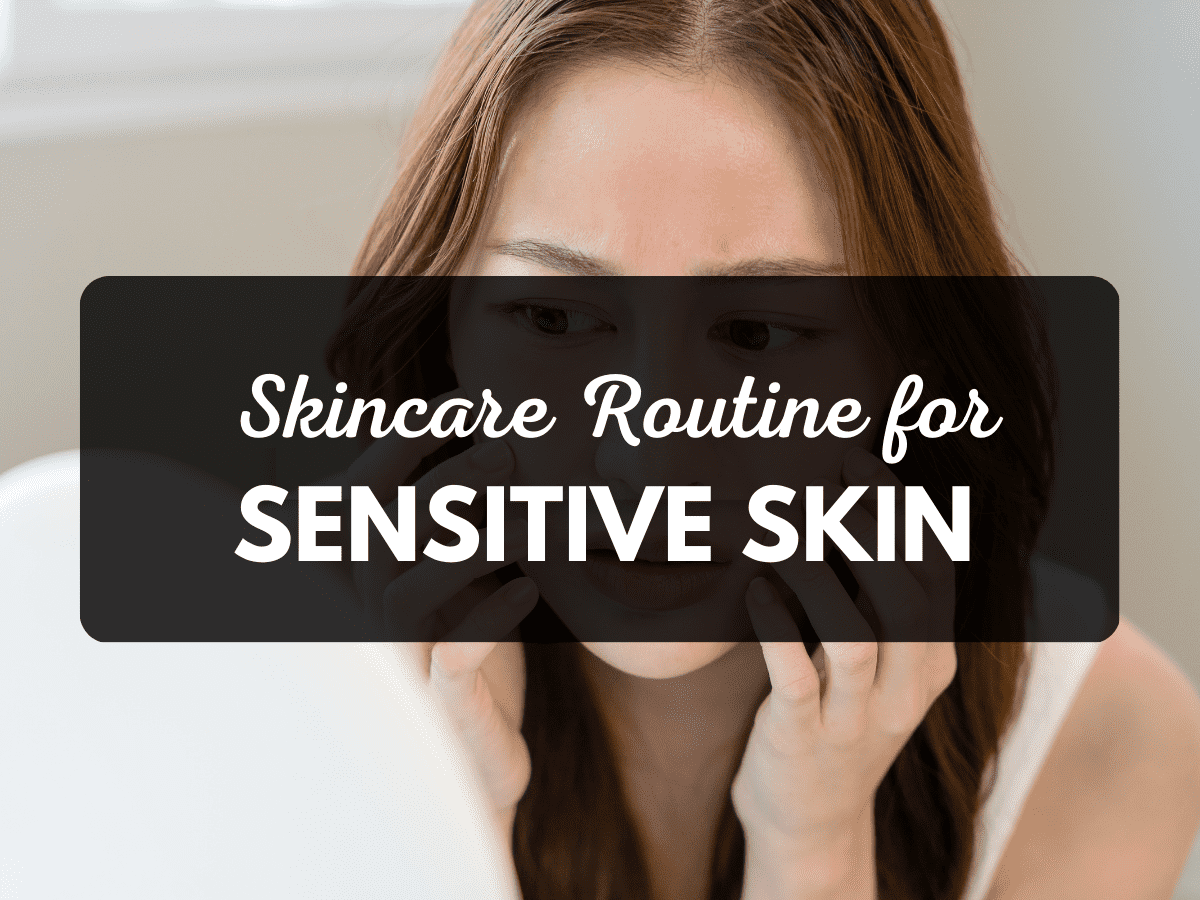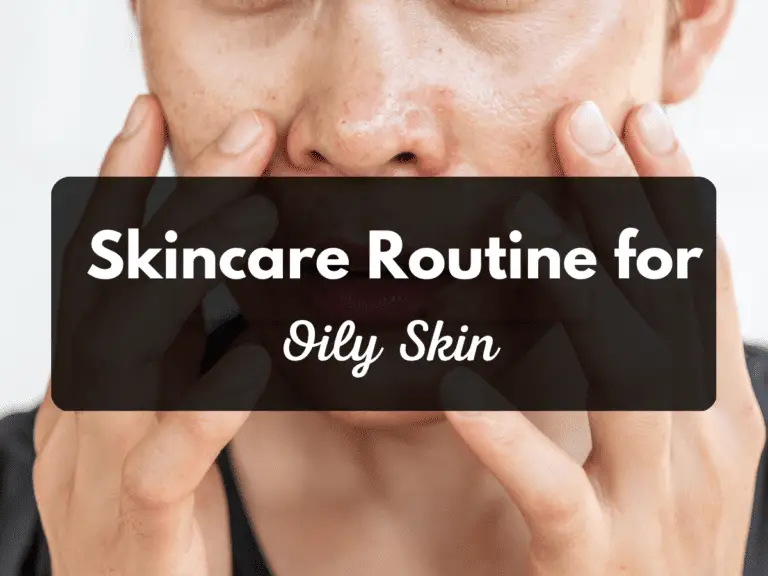Hey there, beautiful!
Do you feel like you have more delicate skin than a newborn?
Do you find yourself avoiding certain skincare products or reacting to the ones you use?
If so, you might be one of the many people out there with sensitive skin. But don’t worry, and you’re not alone!
In this post, I’ll walk you through everything you need about sensitive skin and how to take care of it.
So, let’s get started!
Definition of Sensitive Skin
Sensitive skin is a term used to describe skin easily irritated by certain products or environmental factors.
This can manifest as redness, itching, burning, or even hives. Some people are born with sensitive skin, while others develop it later in life due to various factors.
These include genetics, hormonal changes, exposure to certain chemicals or allergens, and stress.
One of the biggest challenges of having sensitive skin is finding products that work for you.

Many skincare products contain ingredients that can irritate sensitive skin, such as fragrances, dyes, and preservatives.
And while it can be tempting to try out the latest trendy product or follow a celebrity-endorsed skincare routine, this can be a recipe for disaster if you have sensitive skin.
So, what’s the solution?
The answer lies in creating a skincare routine tailored to your unique needs.
Skin care is important for everyone, but it’s especially crucial for those with sensitive skin.
A good skincare routine can help soothe and protect your delicate skin, reduce irritation, and prevent future flare-ups.
What Triggers Skin Sensitivity?
It’s important to remember that what triggers skin sensitivity for one person may not affect another.
So, pay attention to what your skin reacts to and avoid those triggers whenever possible.
This may differ from person to person, but some common triggers include the following:
- Fragrances and dyes in skincare and beauty products
- Harsh chemicals, such as sulfates and parabens
- Excessive heat or cold
- Exposure to UV radiation
- Certain fabrics, such as wool
- Allergens, such as pollen, pet dander, and dust mites
- Stress and emotional factors
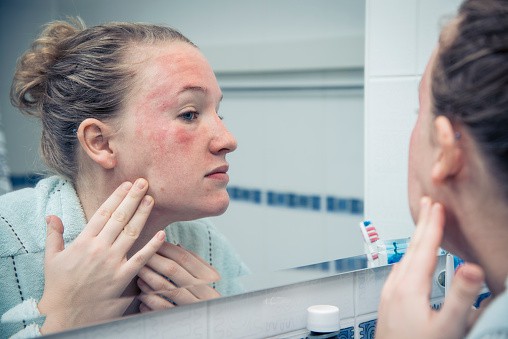
Identifying Sensitivities That Apply to You
In addition to identifying common triggers, it’s also important to determine what specific sensitivities apply to you. This can be done through trial and error or by seeing a dermatologist or allergist.
For example, suppose your skin reacts to certain skincare products. In that case, you can try eliminating them individually to see which is causing the problem.
Alternatively, you can try patch testing, where you apply a small amount of a product to a skin patch and wait 24-48 hours to see if there is a reaction.
If you suspect your skin sensitivity is due to an allergy, you may want to see an allergist for testing.
They can perform skin or blood tests to determine what allergens you are sensitive to.
Once you understand your skin type and sensitivities, you can start building a skincare routine that works for you.
Tips for sensitive skin:
- Stick to gentle, fragrance-free products: Look for products labeled as gentle or formulated for sensitive skin. Avoid products that contain fragrances, dyes, or other potential irritants.
- Moisturize regularly: Sensitive skin tends to be dry, so it’s important to use a moisturizer that will help hydrate your skin. Look for a lightweight, non-comedogenic formula that won’t clog your pores.
- Protect your skin from the sun: Be sure to use broad-spectrum sunscreens with an SPF of 30 to 50. You can also consider wearing protective clothing, such as a hat and long-sleeved shirt, when outside for extended periods.
- Be mindful of your products: Even if a product is labeled as “gentle” or “safe for sensitive skin,” it may still cause a reaction. Try to limit the number of products you use and introduce new products one at a time, giving your skin time to adjust.
- Patch test: For sensitive skin, it’s important to be cautious when introducing new products or ingredients. Start with a patch test and gradually introduce new products to your routine, paying attention to how your skin reacts.
- Manage stress: Stress can trigger skin sensitivity, so it’s important to find ways to manage it. You can also try yoga, meditation, or other relaxation techniques to help reduce stress levels.
Best Practices for a Skin Care Routine for Sensitive Skin
Now that we’ve covered the basics of understanding and identifying sensitive skin let’s dive into the best practices for a skincare routine that caters to this delicate skin type.
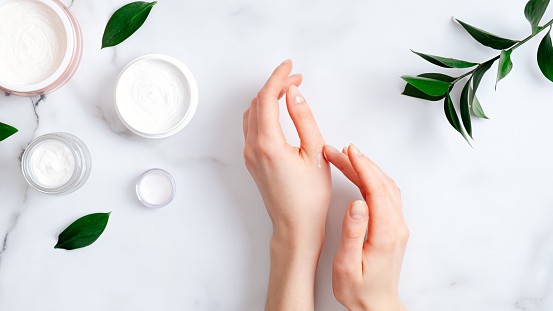
Cleansing Techniques
Cleansing is essential to any skincare routine but particularly important for sensitive skin.
The goal is to remove dirt, oil, and impurities without irritating or stripping your skin of natural oils.
While choosing a cleanser, look for products that are gentle and fragrance-free.
Foaming or gel cleansers are often a good choice for sensitive skin because they are less likely to cause irritation than heavy cream-based cleansers.
Use gentle, circular motions with your fingertips rather than scrubbing or using a washcloth.
This will help avoid irritation and protect your skin’s natural moisture barrier.
Toning Sensitive Skin
Toning can benefit a skincare routine, particularly for oily or acne-prone skin.
Avoid toners that contain alcohol, witch hazel, or other harsh ingredients that can dry out and irritate your skin.
Instead, look for products that contain soothing ingredients like aloevera, chamomile, or green tea.
Apply toner with a soft cotton pad or your fingertips, being careful not to apply too much pressure.
Nourishing Your Skin with Sensitivity in Mind
After cleansing and toning, it’s time to nourish your skin with moisturizers and serums that will help keep it hydrated and healthy.
Moisturize
When choosing a moisturizer, look for lightweight, non-comedogenic formulas that won’t clog your pores.
Avoid heavy creams or lotions containing fragrances, dyes, or other irritants.
Weekly Masks, Peels, and Exfoliations
While daily cleansing and moisturizing are essential for sensitive skin, incorporating weekly masks, peels, and exfoliations can help improve your skin’s overall health and appearance.
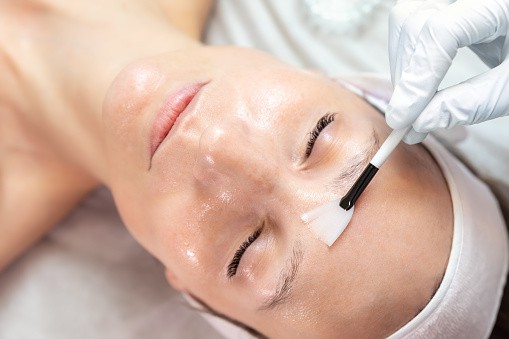
When selecting a mask or peel, look for products that contain gentle ingredients like clay or fruit enzymes rather than harsh chemicals.
These products can help remove dead skin cells and impurities without irritating your skin.
For exfoliation, choose products that are specifically formulated for sensitive skin.
Avoid physical exfoliants like scrubs or brushes, which can be too harsh for delicate skin.
Instead, look for chemical exfoliants like alpha-hydroxy acids (AHAs) or beta-hydroxy acids (BHAs), which gently dissolve dead skin cells.
Remember, paying attention to how your skin reacts is important, even when using gentle products and techniques.
Adjust your routine accordingly if you notice any redness, irritation, or other signs of sensitivity.
How to Deal with Sensitive Skin Breakouts
Dealing with sensitive skin breakouts can be frustrating and challenging. However, treating and effectively preventing them is possible with the right knowledge and approach.
Causes of breakouts:
There are several reasons why sensitive skin may experience breakouts.
One of the most common causes is harsh or irritating skincare products, which can disrupt the skin’s natural balance and cause inflammation. Other factors contributing to breakouts include hormonal changes, stress, diet, and environmental pollutants.

Treating breakouts and preventing future ones:
A gentle and targeted approach to treating the affected area is essential if you’re dealing with a breakout.
First, avoid harsh or irritating products and opt for gentle cleansers, moisturizers, and spot treatments for sensitive skin.
You can look for products that contain ingredients like salicylic acid and benzoyl peroxide, which can help to unclog pores and reduce inflammation.
In addition to treating existing breakouts, taking steps to prevent future ones is essential.
This includes adopting a regular skincare routine tailored to your skin type and avoiding any products or ingredients that have caused irritation or breakouts in the past.
Additionally, try to reduce your stress levels, eat a balanced diet, and avoid touching your face, which can transfer bacteria and oils onto the skin.
Tips to Keep Your Sensitive Skin Healthy
While a good skincare routine is essential for keeping sensitive skin healthy, there are additional considerations that you can make to improve the overall health and appearance of your skin.
Here are some additional tips to consider:
Dietary changes:
Whatever you eat can impact your skin’s health.
Try to include fruits and vegetables in your diet, which are rich in antioxidants and other nutrients that can help to protect your skin from damage and promote healthy aging.
Additionally, limiting your intake of processed or sugary foods contributes to inflammation and breakouts.

Supplement your skincare routine with healthy habits:
While a good skincare routine is essential, there are other practices that you can incorporate into your daily routine to promote healthy skin.
For example, consider getting regular exercise, which can improve circulation and promote healthy skin cell turnover.
You might also try incorporating facial massage or lymphatic drainage techniques into your routine to improve circulation and reduce puffiness.
Relieve stress:
Stress can significantly impact your skin’s health, and it’s important to find ways to manage it effectively.
Consider incorporating meditation, deep breathing, or yoga into your daily routine to help reduce stress and promote relaxation.
Additionally, make sure that you’re getting enough sleep each night, as this can significantly impact the health and appearance of your skin.
By considering these additional tips and practices, you can supplement your skincare routine and improve your sensitive skin’s overall health and appearance.
Remember
Skincare is a holistic process that requires attention to both internal and external factors.
And sensitive skin requires special care and attention to maintain health and appearance.
With patience and a commitment to finding the right products for your skin, you can develop a skincare routine that keeps your sensitive skin looking and feeling its best.

